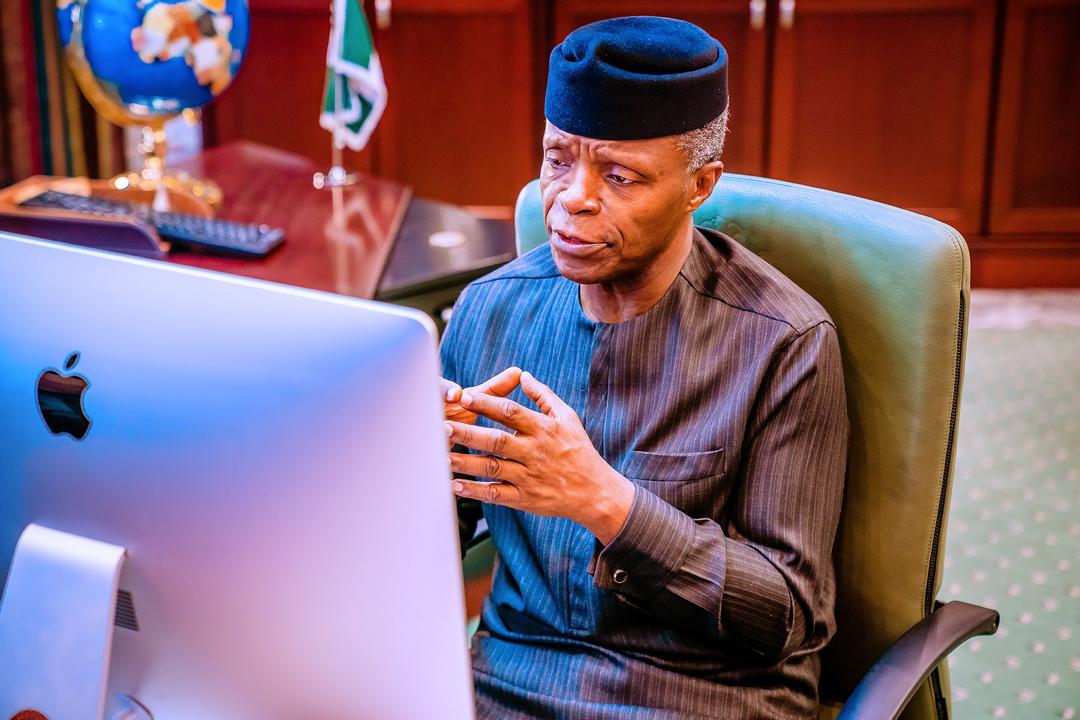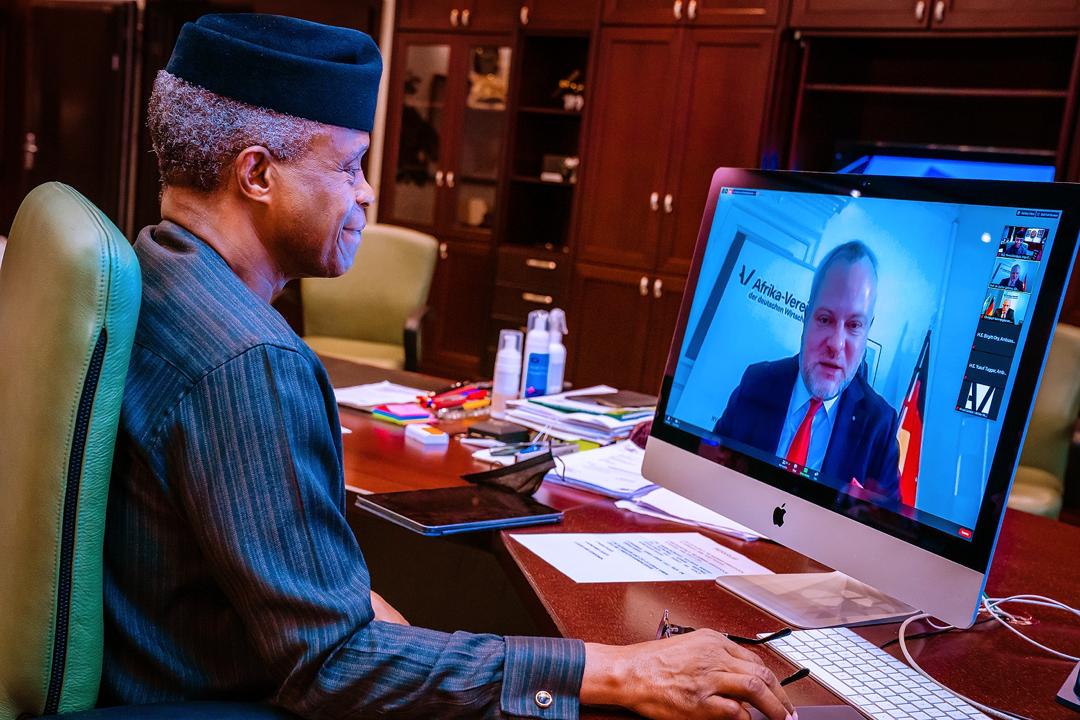VP’s Remarks At The 8th German – Nigerian Business Forum
REMARKS BY HIS EXCELLENCY, PROF. YEMI OSINBAJO, SAN, GCON, VICE PRESIDENT OF THE FEDERAL REPUBLIC OF NIGERIA, AT THE 8th GERMAN-NIGERIAN BUSINESS FORUM ON MONDAY, 9TH OF NOVEMBER, 2020.
PROTOCOLS
I am honoured to join you all today at the 8th German-Nigerian Business Forum holding virtually this year. I fondly recall being in the beautiful city of Berlin in December of 2018 speaking at the first Nigerian-German Business Dialogue, organized by Ambassador Yusuf Maitama Tuggar along with the Afrika-Verein. While we all wait impatiently until it is safe for us to gather again in person, we are grateful for the virtual opportunity to discuss the future of our business relations in this global context.
We are meeting at a time when people the world over are struggling to overcome the economic and social crisis caused by the COVID-19 pandemic, which has disrupted life as we knew it and will for long, in my view, influence our deliberations, and influence the trajectories of our economies and our countries. And of course, this particular gathering will have to discuss very many implications of the pandemic.
As it turned out, the pandemic is no respecter of borders, has forced us to ponder on the importance of collaboration and international cooperation in solving some of our most pressing problems.
There are several reasons why Nigeria and Germany’s economic relationship is an important and natural one. With its population of nearly 200 million people and as the largest economy in Africa, Nigeria is a natural partner of Germany, which is also the largest economy in the European Union and also its most populous country. Both countries have a shared experience of paving the way in their respective continents and serve as strategic entry points for investors across industries.
So, it is encouraging that Germany remains a significant exporter to Nigeria, which is its second-largest trading partner in Africa. Recent reports show that German investment in Nigeria contributes as much as $1billion in turnover annually. German exports contributed 3.91% (N157.2bn) of total imports to Nigeria in Q2 2020. While this is good, there is clearly room for deeper collaboration, especially as we vigorously pursue economic recovery within the context of a vastly improved business environment and a commitment to market-driven private sector-led economy.
Cooperation between our countries and between sectors is now more important than ever and this forum is an essential platform for deliberating on the mutually beneficial ways that we can achieve our shared objectives as nations. And we already have an excellent example the Presidential power Initiative, a power infrastructure upgrade and modernisation programme, agreed to by the Nigerian government and Siemens AG of Germany, with the support of the German Government.
Under the initiative, the Nigerian government will on behalf of the other shareholders in the DisCos (which is our electricity distribution companies) invest in infrastructure upgrades in the form of improved payment systems, distribution substations, transformers, protection devices, smart meters, transmission lines, etc. So, this initiative is particularly important for us and I think it is one of those very clear demonstrations of the type of collaborations that is possible between our governments and the private sector.
The priorities we, as a government, have set for ourselves are centred around nine inter-related and inter-connected areas, which are: stabilizing the economy; achieving agriculture and food security; attaining energy sufficiency especially in power and petroleum products; improving transportation and other infrastructure; driving industrialization with a special focus on SMEs; expanding access to quality education, affordable healthcare and productivity of Nigerians; enhancing social inclusion by scaling up social investments; as well as building a system to fight corruption, improve governance and strengthen national security.
I see a good number of these areas are to be covered in-depth in the sessions in your agenda over the next two days.
The fulcrum of our economic policies is the provision of good well-paying jobs and opportunities for our young population. 70% of Nigeria’s population is under the age of 30. So, that task includes bridging existing skills gaps, facilitating credit for business startups, and building an enabling environment for manufacturing. The huge informal sector especially in the urban areas also consists of many young people some with little in terms of marketable skills. Our technical and vocational skills programme seeks to achieve scale across the country. And we have seen some collaboration between some of our partners, civil society organizations in Germany and some of our partners especially in the area of vocational skills training.
Economic recovery, prior to the outbreak of COVID-19, was modest but steady. Our economy recovered from a recession and we witnessed twelve quarters of consecutive GDP growth since exiting recession. Our GDP grew from 0.8% in 2017 to 2.3% in 2019 but declined 6.1% in the second quarter of 2020 as a result of supply chain disruptions and a slowdown in economic activities due to imposed lockdowns in response to the COVID-19 pandemic.
In response, we developed a N2.3 Trillion Economic Sustainability Plan (ESP) . It consists of fiscal, monetary and real sector measures to enhance local production, support businesses, retain and create jobs and provide succour to Nigerians, especially the most vulnerable.
In addition to improving the health sector, the ESP lays emphasis on labour-intensive interventions in agriculture, light manufacturing, housing, and facilities management.
It also complements ongoing major infrastructural projects in power, road and rail by prioritising the building of rural roads, a plan also for broadband connectivity for all by 2023, as well as providing solar power to five million homes which were not hitherto connected to the national grid.
We have already begun the process of providing financing support for manufacturers and retailers of Off-Grid Solar Home Systems and Mini-Grids who are to provide the systems. The Solar Power Strategy will produce 250,000 jobs and impact up to 25 million beneficiaries through the installation and improving energy access in a sustainable way.
The support to Solar Home System manufacturers and the bulk procurement of local meters will create an additional 300,000 local jobs while ensuring that we set Nigeria on a path to full electrification.
Alongside interventions in these critical areas, the plan is providing different avenues whereby Government will support micro, small and medium enterprises (MSMEs) to enable them to respond to the economic challenges of COVID-19.
This includes safeguarding about 300,000 jobs in 100,000 MSMEs by guaranteeing off-take of priority products, and a Survival Fund to support vulnerable SMEs in certain sectors in safeguarding jobs.
Both schemes are to impact about 1.7 million individuals within a three to five-month timeline. Forty-five per cent of total business beneficiaries will be female-owned, and 5 per cent of total business beneficiaries will be dedicated to special needs business owners.
In addition, under the MSME Survival Fund scheme; 250,000 new business names are to be registered at a discounted rate of N6, 000 by the Corporate Affairs Commission, but this will be free for the MSMEs; while 330,000 transport workers and artisans will get one-time grants.
Following an MOU to be signed by our Bank of Industry (BOI) and the Federal Government, the total beneficiaries for Survival Fund Scheme tracks are about 33,000 beneficiaries per State; with minimum payroll support at N30, 000 and maximum support at N50, 000.
As part of the sustainability plan, the Central Bank of Nigeria (CBN) has created credit facilities (of up to N100B) for the Healthcare (N100 Billion) and Manufacturing (N1 Trillion) sectors. From January, 2020 to date, over N191.87B has already been disbursed for 76 real sectors projects under the N1 trillion Real Sector Scheme; while 34 Healthcare projects have been funded to the tune of N37.159B under the Healthcare Sector Intervention Facility.
The facilities are meant to address some of the infrastructural gaps in the healthcare and manufacturing sector as a fall out to the COVID-19 pandemic and to facilitate the attainment of the Government’s 5-year strategic plan.
In the Agricultural Sector – which makes up 22% of our GDP, we are currently implementing a plan to create 5 million jobs while boosting agricultural production and guaranteeing food security. Over 4 million farmers have already been enumerated, and we are in the process of supporting them with essential inputs. This should lead to expanded production and output by working closely with the private sector to address all issues along the value chain, including production, harvesting, storage, transportation, processing and marketing.
2020 will probably go down as perhaps the most challenging year in recent global history. No one can be blamed for the circumstances that led to it. However, history will hold us responsible as individual nations and collectively if we do not see and seize the immense opportunities that the moment presents.
Bilateral cooperation is a major plank of that effort. We must use the German Nigeria forum to snatch growth and prosperity for our countries from the jaws of the pandemic.
God bless the German Republic and God bless the Federal Republic of Nigeria.
Thank you very much.



